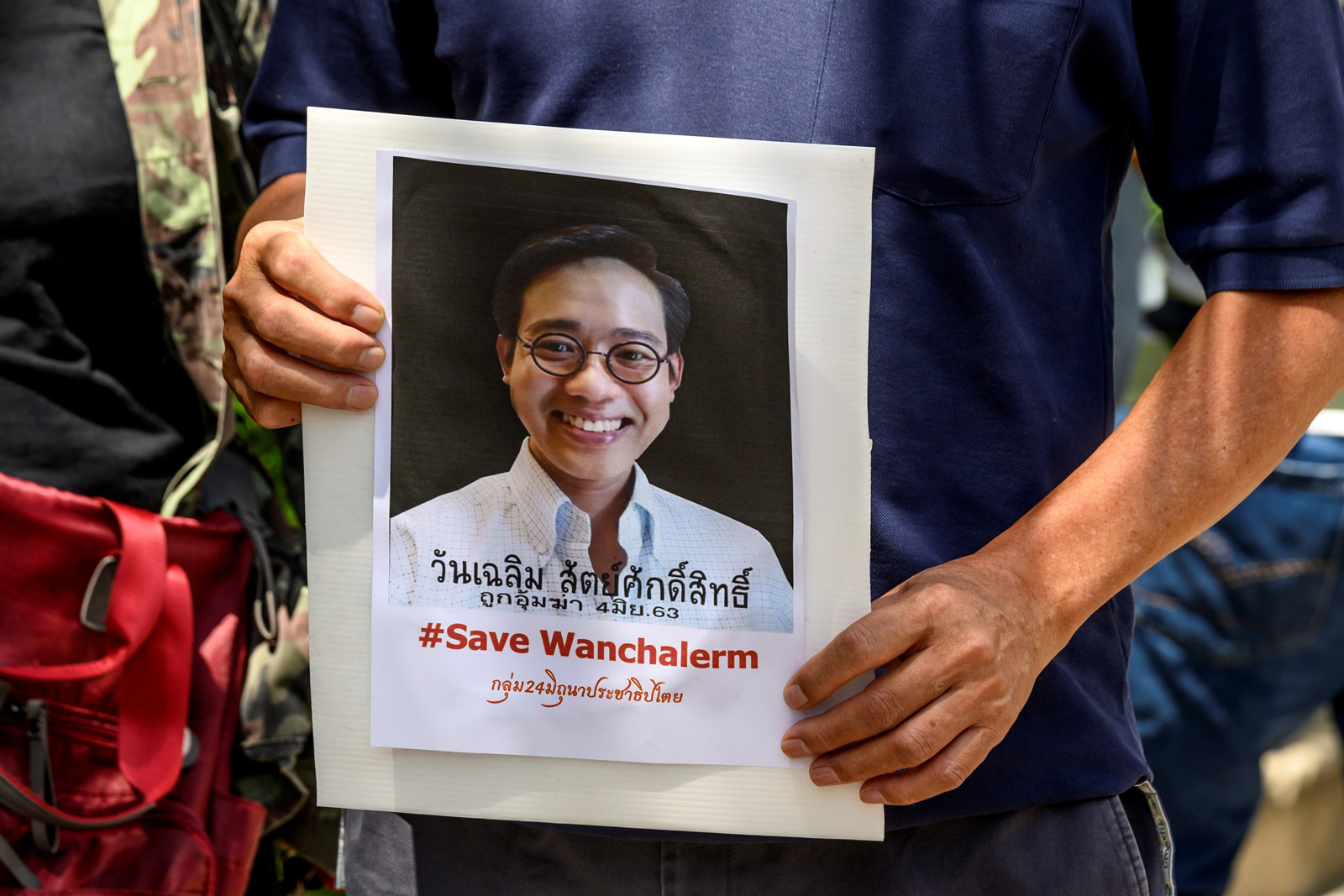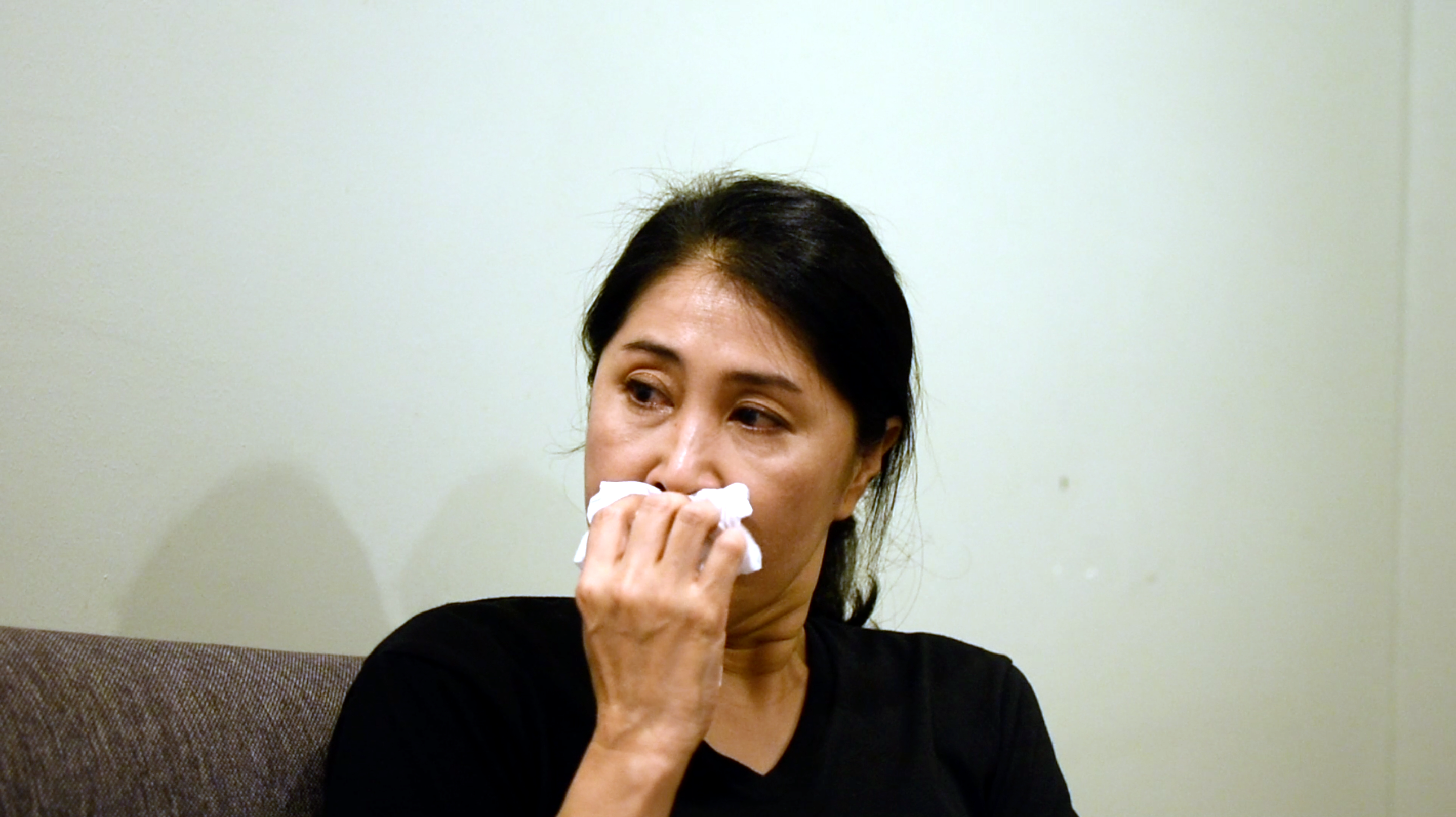In the small, dark sitting room of a hotel suite in Phnom Penh, Sitanun Satsaksit sat on a couch with tears in her eyes and tissue in hand as she recounted the circumstances that had brought her to the Cambodian capital.
The sister of disappeared Thai activist Wanchalearm Satsaksit, Sitanun made the journey east two weeks earlier in the latest step to find justice for her brother, who was allegedly abducted on the street outside his home in a Phnom Penh suburb almost six months ago on 4 June. Many in Thailand, especially those in the democratic movement now rousing the streets of Bangkok, believe Wanchalearm was merely the latest enforced disappearance conducted at the behest of the Thai government.
After a 14-day quarantine to observe for signs of Covid-19, Sitanun was ready to meet with visitors – and plan for the days to come. She and the three Thai human rights attorneys forming her travel party will prepare for an 8 December hearing with the Cambodian judge now investigating her brother’s case. Until then, her team plans a media blitz to keep Wanchalearm’s case in the headlines, as well as seek out potential leads on the missing man.
Months after witnesses reported seeing unidentified armed men forcing the 37-year-old into a black SUV, the family of Wanchalearm still has more questions than answers. The persistent silence of the disappeared has crystalised into a grim answer for some.
“It has been six months, everyone has the state of mind about what may have happened, but everyone in the family still hopes to see him alive,” Sitanun told the Globe through Pornpen Khongkachonkiet.
The director of human rights monitor the Cross Cultural Foundation of Thailand, Pornpen joined Sitanun in the journey to Phnom Penh, along with foundation advisor Somchai Homlaor and Montana Duangprapa of the Thai Lawyers for Human Rights.
Even though Judge Sin Sovannroth of the Phnom Penh Municipal Court will hear what Sitanun has to say come December, Cambodian authorities had for months expressed doubt that a crime had occurred, despite eyewitness accounts and CCTV footage of the events recorded from Wanchalearm’s apartment building in Chroy Changvar. By early November, officials commenting to local media outlets were skeptical that Wanchalearm was even in Cambodia at the time he would have been abducted, stating that his visa had expired in 2017.
But in the weeks since, something has apparently changed in the Cambodian legal calculation. The Cambodian bureau of outlet Voice of America reported on 23 November that the court had issued summons for the investigation of two crimes against as yet unidentified individuals: Unlawful arrest, detention and confinement, and unauthorised possession of weapons. A long overdue development likely stymied by Cambodian-Thai diplomatic considerations, this represents the first public acknowledgement by the Kingdom’s authorities that a crime may have occurred.
The legal team working with Sitanun are pleased with the development but have little idea how much legwork has been done, if any, in investigating the case. Cambodian authorities contacted the Satsaksit through the Ministry of Foreign Affairs and, though a summons was issued to Sitanun in July, she says there’s been no real outreach from Phnom Penh to get a probe started.
“They may have done a lot, they may have done a little – we don’t know,” said Pornpen.
It has been six months, everyone has the state of mind about what may have happened, but everyone in the family still hopes to see him alive
But Pornpen said the mere willingness of the judge to investigate this most recent case was a “really significant” development. Especially in the context of the Thai disappeared who, as a rule, generally vanish with no official acknowledgment – either from the Thai government or the country in which they go missing.
“This is not a petty crime, it is a crime of institutions, many people,” said Pornpen of the broader practice of enforced disappearance, as seen in and beyond Thailand’s borders. “Impunity is at large, and those who keep doing it, are using the same methods.”
Wanchalearm was a prominent online critic who didn’t hold back from commenting on Prime Minister Prayut Chan-o-cha or even the legally revered Thai monarchy, posting an anti-government video just two days prior to his apparent abduction.
Sitanun said that her brother had refused a summons by the then-ruling military junta, the Prayut-led National Council for Peace and Order, and fled the country, eventually settling in Cambodia. Though Wanchalearm continued his commentary on Thai social issues, including those touching the monarchy which are strictly prohibited by lese majeste laws, Sitanun said he had only officially been wanted by authorities for refusal to answer the summons.
Wachalerm is estimated to be at least the ninth enforced disappearance of a Thai activist living overseas since Thailand’s 2014 coup d’etat, which saw former military general and current prime minister Prayut Chan-ocha seize power and many dissident voices seek sanctuary abroad. Among the highest profile of these disappearances remains that of government critics Chatcharn Buppawan and Kraidej Luelert, whose bodies were found in 2019 floating in the Mekong river in the Lao capital Vientiane, disemboweled and stuffed with concrete.
But while the brutality of the murders made international headlines, they failed to even trigger an investigation in Thailand or Laos. To the best of her knowledge, Pornpen believes Wanchalearm’s abduction case could be the first officially investigated enforced disappearance among the many missing Thai dissidents across the Greater Mekong Subregion. There are currently no identified suspects in the June incident, but Somchai, like his colleague Pornpen, linked the Phnom Penh disappearance to those in Laos and elsewhere.

We suspect there were some ‘invisible hands’ from Thailand that reached across the border
“They cannot deny that the crime has already happened here, but the next step is to identify the criminal,” he said. “We suspect there were some ‘invisible hands’ from Thailand that reached across the border.”
Whatever had come before, Sitanun and her allies are now preparing evidence for the upcoming hearing, for which they’re also working with Cambodian lawyer Sam Chamroern. Now that they’re officially out of quarantine and able to leave their lodgings, the group will set out in the days ahead to see what information they can unearth in Phnom Penh.
Thai Lawyers for Human Rights’ Montana said the process of actually bringing the case forward to this point began in July, about a month after Wanchalearm went missing. Lawyers working with the Satsaksit family had submitted a complaint on 3 July to the Ministry of Justice and followed up with another submission on 8 July to the Ministry of Interior and a public prosecutor.
Montana said the public prosecutor had first summoned Sitanun to Phnom Penh in July, but that the initial meeting was delayed due to the Covid-19 pandemic. After attempts to find a solution, the judge reissued a summons in October asking Sitanun for evidence in the case.
Sitting in the hotel kitchen, Sitanun explained that she intended to prove her brother’s whereabouts in Phnom Penh using photos, phone records and bank activity, all of which she said placed him in the capital at the time of the disappearance. Now that she and her small delegation of allies are actually in Cambodia, they hope to uncover more evidence, including witness testimony, that can point local authorities in the right direction.
Montana believes that the tangible evidence available in this case, a rarity in the deeply murky world of enforced disappearances, offers hope for solving this disappearance – and even shedding light on the wider practice of political abductions by Thai authorities.
“This case has very tangible evidence showing how Thai authorities manage to oppress Thai dissidents,” she said. “The sister [Sitanun] was on the phone at the time he was abducted, we also have the CCTV, and journalists from the BBC and VOA visited the site and talked to witnesses, who said something happened there.”
From afar, the small team working to find the truth about the disappearance have had a tougher time piecing together clues. But in the days yet to come, lawyer Somchai is hopeful that local friends and acquaintances of Wanchalearm will come forward to offer more information.
Now sitting in Phnom Penh, the group notes that belongings in Wanchalearm’s home were emptied out by an unknown person, soon after his disappearance. As to who that might have been or why it was done, they can’t be sure – and the lawyers are quick to dismiss as hearsay a potential coverup of the crime. Whatever is left in the home, Somchai hopes to bring it back to Thailand.
“His mother is waiting there,” he said. “We should be able to take something there to her.”

The Cross Cultural Foundation works with several families of the disappeared, and Pornpen points to at least 80 Thai dissidents and activists who have gone missing without a trace within and beyond the kingdom’s borders.
Just before leaving Bangkok for Phnom Penh, Pornpen said, the group had marked the birthday of Siam Theerawut, who was arrested attempting to cross into Vietnam from Laos in May 2019. Along with fellow dissident Kritsana Thapthai, he was apparently extradited to Thailand and hasn’t been seen or heard from since. Thai authorities deny any knowledge of their whereabouts.
As protests continue to roil in Bangkok, where anti-government demonstrators have stepped up demands including the resignation of Prayut and an overhaul of the Thai constitution to remove military influence, the faces of Wanchalearm and the others disappeared have become symbols of resistance. Protesters have called for the release of the activists, or at least accountability for crimes committed against them.
Now unemployed and dedicating her full attention to her brother’s case, in a previous life before Wanchalearm went missing Sitanun had worked in real estate. Politically apathetic by her own admission, she hadn’t shared her brother’s political fervour or leanings before his disappearance.
But now, as she watches protesters potentially facing a similar fate as the movement’s leaders endure escalating intimidation tactics by authorities, she sees added value in pursuing the truth about Wanchalearm and the work of pro-democracy activists.
“I hope our work here is a preventive measure, that it could prevent this from happening again,” Sitanun said. “Now with a full heart, I support the movement.”


